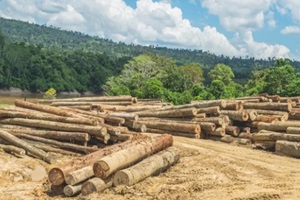
Weather can turn any plan upside down, but for companies that must operate outdoors, Mother Nature can be particularly threatening. A sudden change in weather can mean terrain changes that make work hazardous, exposure to dangerous storms or wildfires, and even the need for an adjustment to the work timeline.
Logging companies are especially susceptible to weather-related risks because their work must be conducted entirely outdoors, and often in remote regions. To protect against weather-related risks, logging companies must invest in broad-spectrum insurance coverage with the weather in mind.
To choose policies relevant to a company’s work, they must consider the location of the logging, weather patterns, and what type of work they are doing to understand how the weather might interfere with the project.
Here is some insight into the weather-related risks in logging and how insurance can help.
The Biggest Weather Risks in Logging
The risks that weather poses to a logging operation will depend on where the project occurs. Some areas in the United States are prone to severe snowstorms in remote regions. In contrast, others never get cold enough to see snow. In general, the most significant threats that weather can bring to a logger’s job site are:
- Heavy rain coupled with lightning
- Wildfires
- Flooding
- Ice and freezing rain
- High winds
These elements can leave workers at risk, threaten machinery and equipment, and potentially even damage the timber itself.
The Right Logging Insurance for Weather Troubles
No one-size-fits-all blend of coverage addresses every weather event and the consequences it may bring to a logging site. However, many logging companies are prone to the same damage and financial difficulties caused by weather. Thus, while each company should work with industry professionals to round out their coverage, a few baseline policies targeted toward weather are a great place to start. Be sure to consider:

Business Interruption
When icy rain impairs roads or a wildfire forces an evacuation in the area, logging companies cannot do much besides accept Mother Nature’s whims and comply. However, this delay can throw off project timetables, leading to a company losing money on opportunity costs and the need to pay employees, equipment and facility rent, and more while not turning any profit. Business interruption insurance can cover these costs until loggers can return to the field.
Workers’ Compensation
Logging companies must have some form of workers’ compensation. Still, the essential questions are how much is included and what types of injuries and events are excluded.
Logging workers’ comp insurance should already be more comprehensive, as this industry is one of the most dangerous; however, be sure that your workers’ compensation insurance also addresses injuries that can result from weather events.
From workers who slip on ice or muddy hills to potentially even those who become victims of a lightning strike, plenty can go wrong on a logging job, and workers will be counting on good coverage to help pay their medical bills and get them back to work.
Equipment Protection
Logging equipment is tough but may not withstand everything nature throws at it. Whether the cold and ice destroy a machine’s electrical components or a wildfire encroaches faster than heavy machinery can be extracted, and it is lost to the flames, logging companies face substantial financial risk when leaving equipment up to the whims of the weather. Equipment insurance can help pay for repairing or replacing these essential items.

Flood Coverage
Flooding is a concern for logging companies that are harvesting in lowland tracts. Floods pose numerous risks, each of which is financially detrimental to a logging company.
It may destroy the timber before the company can harvest it, threaten worker lives, destroy equipment, and even carry pollutants such as gasoline into the environment. Flood insurance can help companies recover the cost of their lost timber. It may even address the consequences of pollution, depending on the policy.
Mitigate Weather-Related Risks With Logging Insurance
The weather will never be predictable, but insurance coverage can be. With help from industry professionals, your logging company can head into rugged terrain with confidence that no matter what Mother Nature decides, your business will be protected from the financial fallout of a problematic weather event.
Contact Burton & Company today to discuss the weather trends in the areas where you work and create a mixture of insurance coverage types that address the many financial risks you face during logging.

